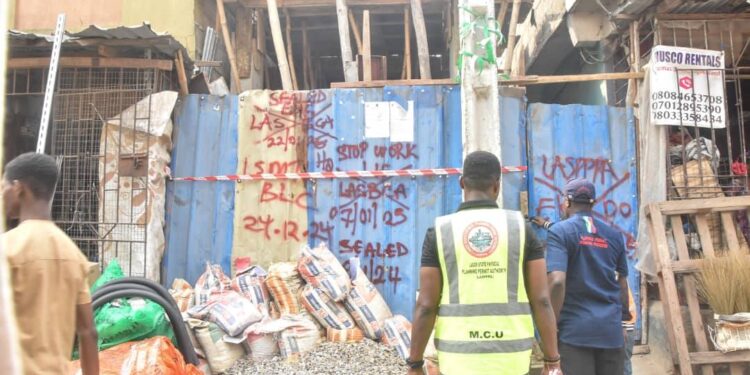In a sweeping enforcement operation on Friday, the Lagos State Government shut down several construction sites on Lagos Island for failing to comply with essential planning permit requirements.
This decisive action is part of the state’s ongoing campaign to curb unregulated development and uphold urban planning standards.
The crackdown was spearheaded by Dr. Oluyinka Olumide, Commissioner for Physical Planning and Urban Development, and targeted properties that had ignored an extended amnesty program designed to assist property owners in regularizing their building permits. According to a statement shared on the government’s official Facebook page on Saturday, this enforcement underscores the state’s firm stance against illegal construction and its commitment to maintaining a safe and orderly cityscape.
The amnesty program, which initially ran from May 2 to July 30, 2024, provided a rare opportunity for property owners and developers to obtain building approvals without incurring penalties. The program was further extended twice, first to October and later to December 31, 2024, to allow more participants to comply. Despite these leniencies, many property owners chose to flout the rules, pressing ahead with unauthorized constructions that violated structural, environmental, and safety standards.

Commissioner Olumide expressed disappointment at the lack of compliance, stating, “The amnesty program was a golden opportunity for property owners to regularize their building permits without facing immediate consequences. Unfortunately, many disregarded this initiative, choosing instead to erect illegal structures that fail to meet safety and urban planning standards. The government’s objective is not to punish but to ensure compliance, protecting the lives and properties of all Lagos residents.”
The enforcement team sealed several properties in prominent areas, including buildings on Okesuna Street, Okepopo Street, Sunmonu Street, Olushi Street, and Isale Gangan Street. A construction project at No. 8 Isale Gangan Street was particularly flagged for its inadequate setbacks and air spaces, raising serious safety concerns. Other affected areas included Oroyinyin, Faji, and Omididun streets, where ongoing developments failed to meet the city’s planning and structural regulations.
Dr. Olumide stressed that unregulated developments not only jeopardize public safety but also disrupt the city’s master plan, leading to structural collapses, environmental degradation, and poor urban aesthetics. He urged developers and landowners to prioritize compliance, emphasizing the long-term benefits of proper urban planning. “Adherence to these regulations is not optional—it is critical for creating a livable, sustainable Lagos,” he added.
In a bid to encourage sustainable development, the commissioner also advocated for land-pooling strategies, particularly for owners of small adjoining plots. This approach, he explained, could foster better land utilization, allowing for more organized and sustainable urban environments.
The enforcement operation was conducted with the involvement of key officials, including the Permanent Secretary of the Office of Physical Planning, Engr. Olumide Sotire, directors from the Ministry of Physical Planning, and representatives from the Lagos State Physical Planning Permit Authority (LASPPPA).

The Lagos State Government reaffirmed its commitment to extending this enforcement drive to other parts of the state, leaving no room for illegal developments. This proactive stance reflects a broader vision to safeguard lives, protect the environment, and maintain the aesthetic integrity of Lagos as a thriving metropolis.
As the government intensifies its efforts, property developers and residents are being reminded of their responsibility to obtain proper approvals before embarking on construction projects. The recent operation serves as a clear signal that non-compliance will not be tolerated, as Lagos pushes forward with its mission to ensure a safe, orderly, and sustainable urban landscape.



